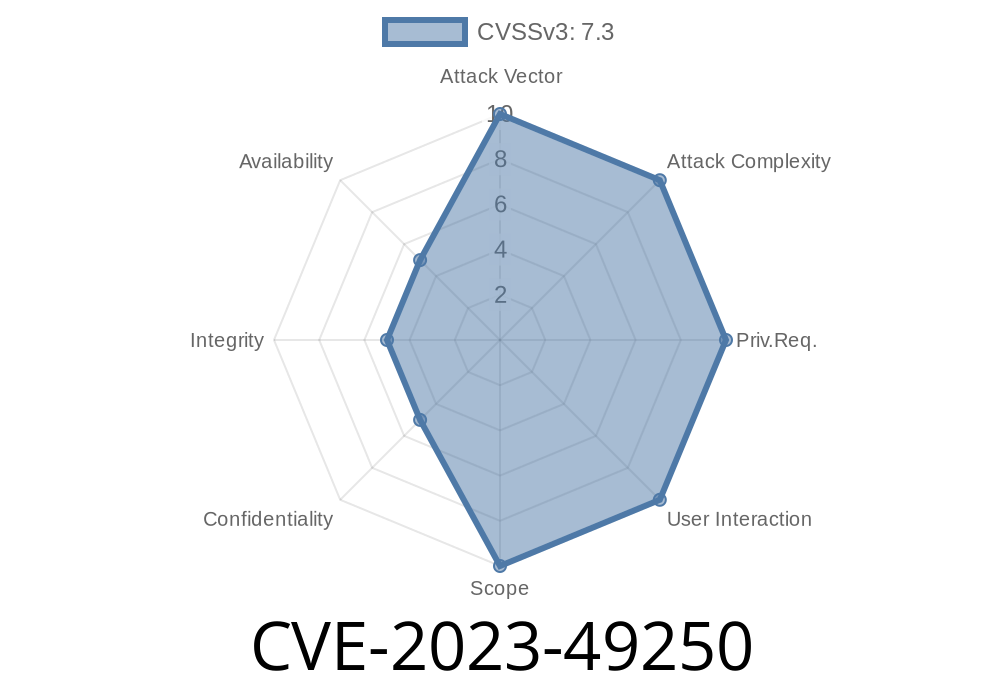Apache DolphinScheduler is a powerful open-source workflow scheduler system, widely used for orchestrating complex data pipelines. But recently, a critical security flaw was found – CVE-2023-49250 – that left users dangerously exposed. Let’s break down what happened, see a code snippet from the vulnerable area, understand how an attacker might exploit it, and how you can protect your pipelines now.
What is CVE-2023-49250?
CVE-2023-49250 is a security vulnerability in versions of Apache DolphinScheduler before 3.2.. It’s caused by the HttpUtils class, which made HTTPS requests without verifying server certificates. This means anyone who could intercept your network traffic could pose as your API/server, potentially exposing secrets, credentials, and sensitive payloads.
Organizations running DolphinScheduler versions before 3.2.
- Deployments on networks where attackers could perform Man-in-the-Middle (MITM) attacks (corporate, cloud, public WiFi, etc.)
Authenticating the server to the client (server shows a verified certificate)
But in some bad implementations, developers skip verifying certificates — maybe for "testing" purposes. In this vulnerability, that’s exactly what happened.
Vulnerable Code Snippet
Below is a simplified version of what might have caused the problem in DolphinScheduler’s HttpUtils:
// This disables certificate checks! DO NOT USE in production.
TrustManager[] trustAllCerts = new TrustManager[]{
new X509TrustManager() {
public java.security.cert.X509Certificate[] getAcceptedIssuers() { return null; }
public void checkClientTrusted(X509Certificate[] certs, String authType) { }
public void checkServerTrusted(X509Certificate[] certs, String authType) { }
}
};
SSLContext sc = SSLContext.getInstance("SSL");
sc.init(null, trustAllCerts, new java.security.SecureRandom());
HttpsURLConnection.setDefaultSSLSocketFactory(sc.getSocketFactory());
What does this do?
It tells Java to trust all certificates (even fake ones), which is dangerous. Any attacker “in the middle” can generate a self-signed cert and pretend to be anyone.
Exploit Scenario: How an Attacker Could Abuse This
Suppose you’re running DolphinScheduler to call APIs, or downloading scripts from a central resource, all over HTTPS. An attacker on the same network, or who can intercept traffic between your DolphinScheduler and its targets, can pretend to be those remote endpoints.
Step-by-Step Exploit
1. Attacker sets up a rogue WiFi hotspot, or hacks a switch/router.
2. Victim’s DolphinScheduler makes an HTTPS call (e.g., to https://myapi.example.com).
DolphinScheduler DOES NOT validate the server’s real certificate.
5. Attacker sends back malware or grabs sensitive headers/data.
Example: Exploiting With mitmproxy
Let’s use mitmproxy as a test MITM tool.
mitmproxy --mode transparent --ssl-insecure
If DolphinScheduler is set up on a workstation routed through mitmproxy, and HttpUtils is making HTTPS calls without validation, mitmproxy gets decrypted traffic, and can inject tailored responses.
*Credential Theft*: API keys, tokens, passwords could leak
- *Data Tampering*: Attacker can modify results, inject malicious payloads/scripts
The Fix: Stronger HTTPS in v3.2.1
The DolphinScheduler team released a fix in version 3.2.1, which properly checks SSL certificates before trusting connections.
Recommended Action:
Upgrade to 3.2.1 or higher immediately!
> Download the secure version here.
References & More Reading
- CVE-2023-49250 (MITRE/NVD Record)
- Original DolphinScheduler Issue
- Apache DolphinScheduler Releases
- About MITM Attacks – OWASP
TL;DR
CVE-2023-49250 left older DolphinScheduler versions trusting ANY HTTPS connection, making MITM attacks trivial.
Update to 3.2.1+ ASAP.
Don’t play with SSL validation – it’s your first line of defense.
Timeline
Published on: 02/20/2024 10:15:08 UTC
Last modified on: 11/29/2024 16:15:07 UTC
